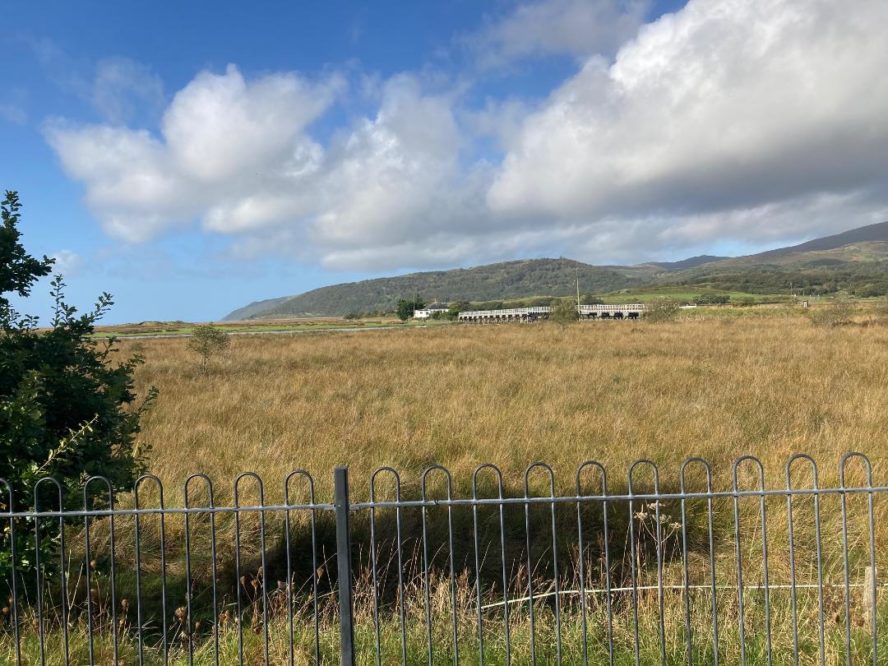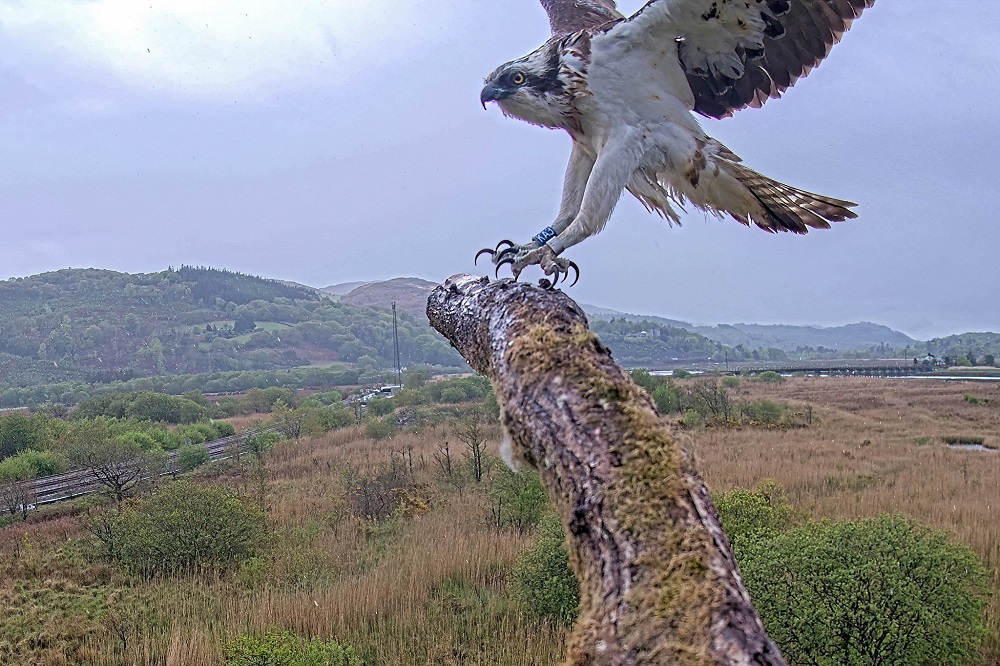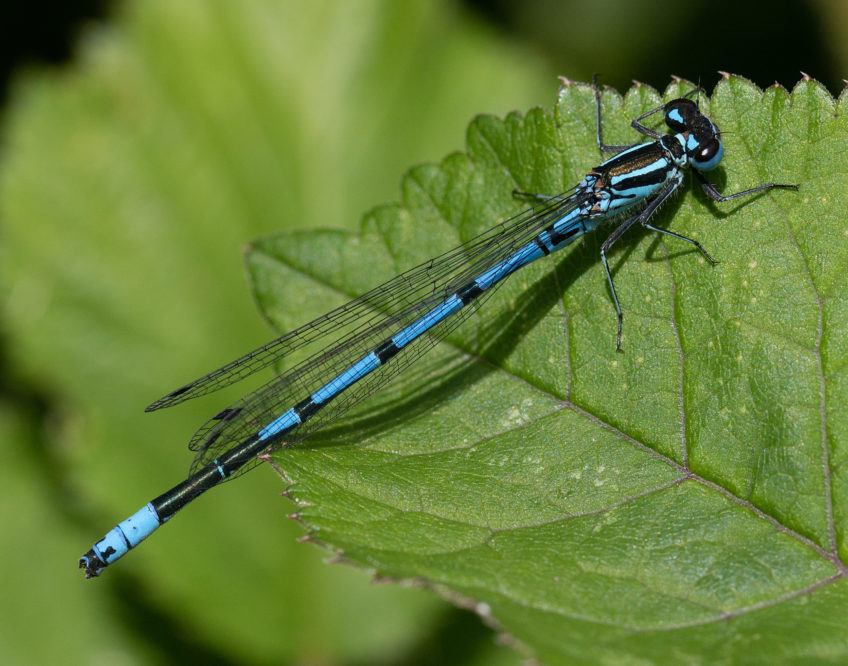Letter from Dyfi Junction

Niall Griffiths
There must be more remote stations in Scotland, say, or England’s far north, but it feels terminal here, an endpoint, exposed and isolated.
The mountains across the marsh are blue in the haze, furred at the flanks, as if in the process of creation. The far sea sparkles.
It’s an important hub, really – one track will take you up the coast to Pwllheli, the other inland to Birmingham. This is where you have taken your first movements towards New York, Berlin, Madrid: big world cities starting here at this halt in the hills (halt? More a hiccup, a hitch, in the story of human movement).
You could’ve changed trains at Machynlleth, with its cafes and shops, but Dyfi Junction has an osprey’s nest and a breeze and birds and things to tell you about essential human isolation.

Hesgyn the Osprey – Picture Montgomeryshire Wildlife Trust/Dyfi Osprey Project/FacebookOspreys
You step off the train and stand and stare. The locomotive boggles and rattles for a minute then clanks and chugs away and you watch it shrink as it moves along the track away from you. Silence and aloneness.
Swooning
It’s a beautiful September day and the ospreys have gone from their nearby nest and are now great wingéd things over mainland Europe somewhere but you’ve seen them, here, swooning off the pole on which they’ve built their nest, bringing glittering violin-shaped fish back to their offspring (which you’ve watched feed on the webcams of the Dyfi Osprey Project: tatty-headed, impish, shrieking things, already imprinting into their brains the ancient pathways that will one day return them to this place).
A high buzzard squeals. In the foreground is one yellow flower.
Morfa
You eat an apple and a muesli bar and wish you had some water. Over the Morfa (the sea-marsh) you can see the hill, in a cottage on the crest of which you completed your first novel, all those years ago: you remember writing the final words and taking a jug of tomato juice and vodka onto the mountainside to get celebratorily drunk with the sheep.
You can almost see it, from this remove; re-taste it.
How different your life was then. How you could never know what awaited, two decades into your future, and if you could’ve known and would’ve felt the anticipatory heartbreak and fear and maybe wept and prayed in supplication for the needed strength, what would have been the point?
What would have been the amelioration? Would it really have done any good?
Alone
There you were, then, alone on the peak of that distant hill, and here you are now, alone on this concrete platform.
There is a plastic shelter. A timetable. A digital noticeboard telling you the times of the trains due to arrive, how many carriages they will be comprised of (never enough), and what stations they will be calling at: Caersws. Penhelig. Tywyn. Morfa Mawddwy.
How you’ve always loved the sound poetry of these names.

Damselfly
There is a butterfly, the name of which you know yet feel is unimportant to record. Likewise with the damselfly that attaches itself to the single yellow flower; you see it as an astonishing arrow, and just that.
You turn your back to the marsh and the mountains and the isolate cottage in which you once were younger and look at the meadows that fringe the Ynyshir nature reserve; you see elegant and exquisite white birds that stalk high-stepping through the shallow waters, and you know that they’ve been labelled as ‘egrets’.
Ghosts
Behind them are birds called ‘geese’ that seem to be chatting to each other in sounds both brilliant and indescribable.
There is a tree, a small bare tree, stunted and bent and twisted by a wind that can blow as merciless as the world. This unpeopled place. Only the ghosts of yourself. And a voice that you can almost hear; a whispering, out of which you cannot discern words but are drawn to the urgency of its tone. You lean into it. It moves away.
This is all there is. Just you here on this concrete and macadam slab like a patient on an operating table. Often the wind whips, here, but not today. Soon you will hear the tracks whoop as your train nears, and you wonder whether the sound will be welcomed.
Support our Nation today
For the price of a cup of coffee a month you can help us create an independent, not-for-profit, national news service for the people of Wales, by the people of Wales.






Thanks to RS Thomas, poet of stony fields, and his great friend William Condry, ornithologist and natural historian of wild Eryri, that we have Ynyshir as a nature reserve.
Dyfi Junction! Memories of going back to Aberystwyth with luggage in advance, from Llanrwst, via Llandudno junction, then at Menai Bridge station (it existed) joined by the Ynys Mon students, Caernarfon, Afonwen, joined by the Llangollen students at Penrhyndeudraeth, then at Dyfi Junction, the London crowd! What a shame they closed all those railway lines. Now I live in Japan where rural branch lines are beginning to be closed, but many still run. Catharine
Imagine this coast and its estuaries before the railways, a ship builders preserve, a ticket to anywhere with a coast, no problem…especially the Mawddach…